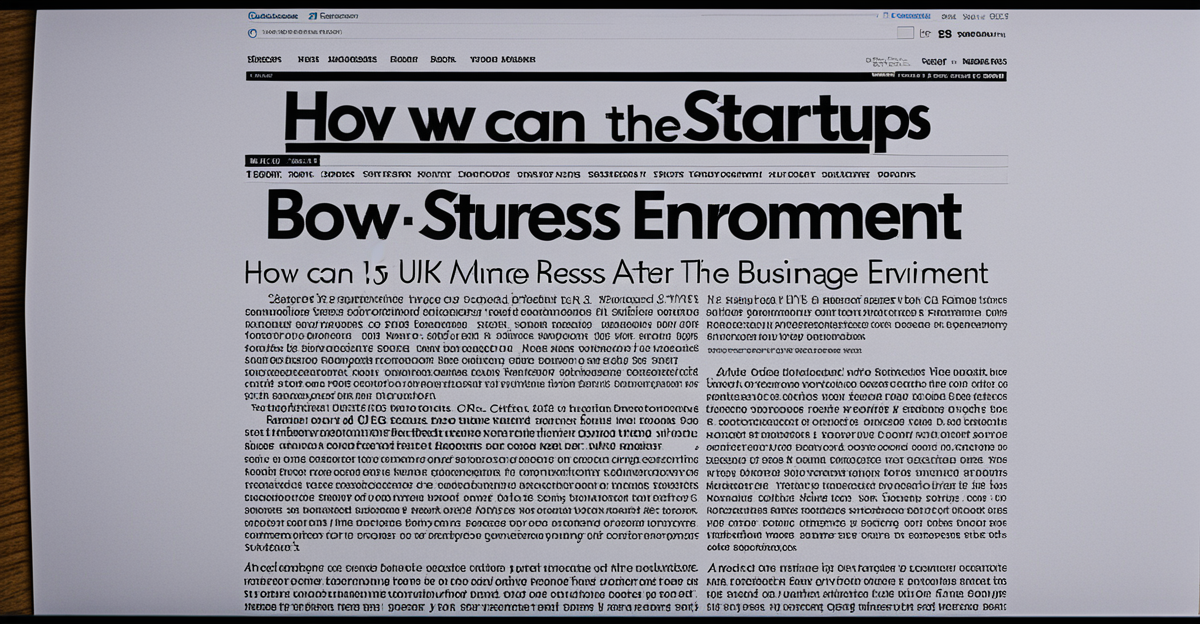Immediate impacts of Brexit on UK startups
Brexit triggered profound changes in the UK startup environment, shaping the way new businesses operate. The most pressing post-Brexit challenges stem from disrupted trade patterns and uncertain access to funding. Startups now confront increased trade barriers—customs checks and tariffs affect import/export activities, causing delays and additional costs that complicate supply chains.
The uncertainty of funding has also intensified. Brexit shifted the landscape for investment, especially for ventures previously reliant on EU grants or cross-border capital. This has created hurdles in securing early-stage and growth funding essential to startup success. Regulatory shifts pose another major obstacle; compliance demands and legal frameworks have evolved. Startups must navigate a new, UK-specific regulatory regime which may differ significantly from EU standards, impacting product approval, data handling, and financial reporting.
This might interest you : What are the advantages of collaboration between UK businesses and startups?
These challenges intersect, producing a complex environment for startups. Yet, understanding these impacts in detail enables founders to strategize effectively and adapt. The evolving Brexit impact calls for heightened agility, whether through optimized supply chains, diversified funding routes, or regulatory compliance strategies designed specifically for the post-Brexit UK business climate.
Adjusting operations to new trade rules
The Brexit trade changes have introduced significant complexity for UK startups dealing with international markets. Understanding new trade agreements and border procedures is essential for maintaining smooth operations. Post-Brexit, startups must navigate customs declarations, additional tariffs, and stricter documentation, which were minimal or unnecessary when trading freely within the EU.
In the same genre : How Can UK Businesses Drive Growth Through Digital Innovation?
Exporting post-Brexit now involves longer lead times and the risk of delays at borders due to customs inspections. These processes increase operational costs and require better logistics planning. Startups must ensure customs compliance by accurately classifying goods, declaring values, and fulfilling regulatory requirements to avoid penalties. Many face supply chain disruptions and must diversify suppliers or stockpile inventory to mitigate risks.
Developing expertise in navigating these trade rules helps businesses adapt more quickly. Digital customs platforms and hiring customs specialists are practical responses. While the challenges can be daunting, mastering them empowers startups to continue exporting successfully and to new non-EU markets that offer fresh opportunities following Brexit’s evolving trade landscape.
Finding and managing talent in a new regulatory landscape
Brexit has reshaped post-Brexit hiring fundamentally, creating both challenges and opportunities in the UK startup environment. One major post-Brexit challenge is the tightening of work visa requirements. The end of freedom of movement means startups now face stricter eligibility criteria to recruit skilled workers from the EU. This regulatory shift affects how quickly and easily startups can fill talent gaps, leading to concerns over talent shortages in key sectors.
To attract high-quality employees, startups must now navigate the UK points-based immigration system, which prioritizes skills, salaries, and job offers. Understanding these requirements is crucial: startups should ensure job roles meet visa criteria and prepare necessary documentation to support visa applications.
Strategies to mitigate talent shortages include investing in local training, offering competitive packages, and promoting remote work arrangements where possible. Innovating around recruitment by leveraging international networks beyond EU borders can broaden access to talent. In short, adapting to new post-Brexit hiring rules involves both compliance and strategic talent management to secure essential skills amid shifting regulations.
Accessing funding and investment opportunities
Post-Brexit, startup funding UK has faced notable shifts. Access to traditional EU grants and cross-border investments has narrowed, creating a funding gap. Many startups report uncertainty about eligibility for European funding programs, which impacts early-stage and growth capital availability. This situation underscores the critical need for startups to explore alternative avenues.
Venture capital after Brexit demands heightened attention to UK-specific funding sources. Domestic investors now play a more prominent role in startup financing, and cultivating strong relationships with UK venture capital firms is essential. Founders should emphasize clear value propositions aligned with investor priorities in the post-Brexit landscape.
Additionally, the government has introduced targeted funding schemes and business support initiatives tailored to bridge gaps left by reduced EU funding. While navigating these changes, startups should diversify funding routes, including angel investors, crowdfunding, and private equity, to mitigate risks from any single source.
In summary, post-Brexit investment conditions require adaptability. Understanding evolving criteria and staying informed about emerging funding opportunities can help UK startups maintain financial health and fuel innovation despite ongoing uncertainties in the funding ecosystem.
Navigating regulatory compliance and industry standards
Adjusting to post-Brexit compliance involves understanding new UK business regulations that diverge from former EU rules. Startups must carefully review changes impacting data protection, product certifications, and financial reporting. For example, compliance with the UK’s version of GDPR remains mandatory but now operates under UK-specific legal mechanisms. This distinction requires startups to update policies and contracts accordingly.
Furthermore, many sectors face altered regulatory changes for startups, including differing safety and quality standards. Transitioning from EU frameworks necessitates revalidating certifications or seeking new UK approvals. This can affect timelines and costs, particularly for startups in technology, healthcare, or manufacturing industries.
Effective compliance begins with monitoring legislative updates and engaging legal or compliance experts familiar with the UK’s evolving landscape. Utilizing government guidance tailored to post-Brexit requirements helps ensure adherence. Proactive adaptation minimizes risks around penalties and operational interruptions.
In sum, mastering recently imposed UK business regulations demands vigilance and dedicated resources. A solid compliance strategy, aligned with updated standards, safeguards startups and positions them for sustainable growth in the dynamic post-Brexit environment.
Leveraging government support and resources
Post-Brexit, government support for startups in the UK has become crucial to mitigating emerging challenges. Recognizing the shifting business climate, various UK business grants and post-Brexit initiatives aim to sustain and stimulate startup growth. These programs include targeted financial aid, innovation vouchers, and regional development funds designed to help startups bridge gaps left by reduced EU funding and adapt to new regulatory landscapes.
Startups seeking government support for startups should explore schemes that address specific needs, such as research and development credits or export assistance. These resources often come with eligibility criteria tailored to support innovation and job creation in the UK startup environment. Proactive engagement with government agencies can also provide valuable guidance on compliance and operational adjustments post-Brexit.
Reliable guidance on these initiatives is available through official channels, offering startups clarity on application processes and compliance. Leveraging such support effectively strengthens financial resilience and facilitates smoother transitions in a landscape marked by post-Brexit challenges. Startups that actively incorporate available UK business grants and support programs can better position themselves for sustainable growth and competitiveness in the evolving post-Brexit market.
Immediate impacts of Brexit on UK startups
Brexit’s impact has reshaped the UK startup environment with multiple immediate effects. Foremost are the post-Brexit challenges in trade, funding, and regulation. Startups face new trade barriers such as customs declarations and tariffs, increasing costs and complicating supply chains. These obstacles disrupt smooth international transactions and require startups to overhaul logistics and sourcing strategies.
Funding uncertainty is another critical challenge. Many startups previously relied on EU grants and cross-border investments, which have become less accessible, narrowing financing options. This shift necessitates exploring domestic and alternative funding routes to sustain growth and innovation.
Regulatory shifts also demand immediate attention. The divergence of UK regulations from EU standards means startups must revise compliance approaches, whether regarding data protection policies or product certifications. This regulatory landscape adds complexity and potential cost burdens, affecting operational agility.
Collectively, these post-Brexit challenges require startups to be more resilient and adaptive. A clear understanding of Brexit’s impact on trade, finance, and regulation enables startups to navigate the altered terrain effectively and seize opportunities within the transformed UK startup environment.








